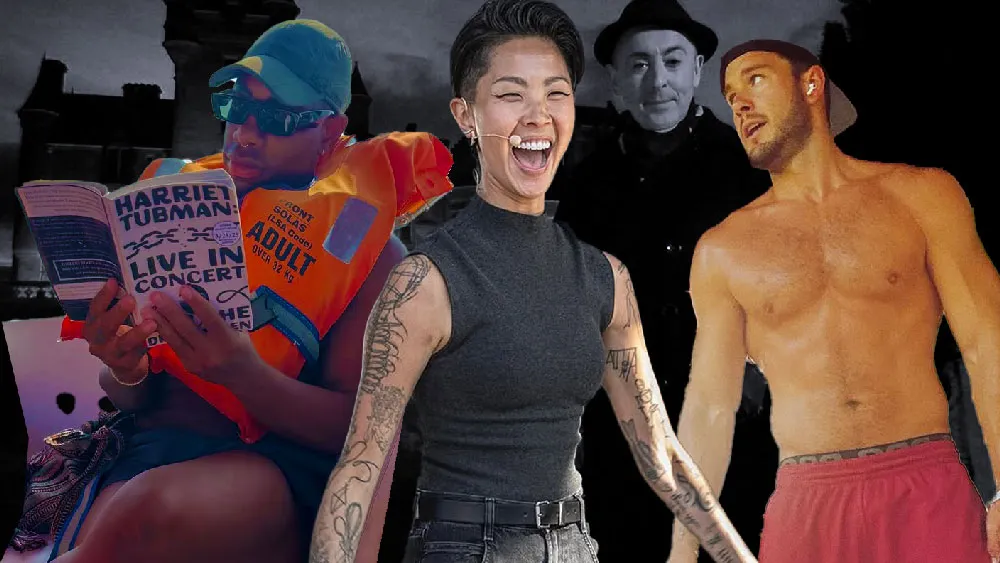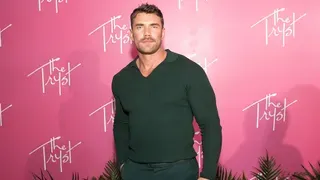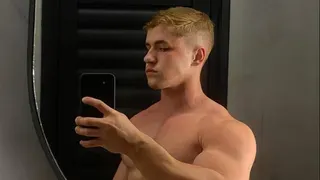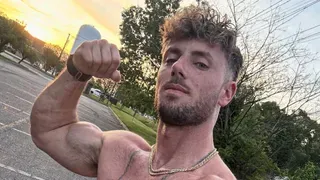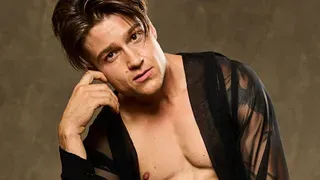July 16, 2008
Love, Sex, Magic, Alternative Families: Warren Rochelle on 'Harvest of Changelings'
Kilian Melloy READ TIME: 9 MIN.
Harvest of Changelings, Warren Rochelle's fantasy novel about misfit kids growing up to discover that they are actually faeries, is now available in a paperback edition from Golden Gryphon Press. The author has a merry time of it, telling an action / adventure story while exploring the norm for faerie families: unlike human marriages, faeries bond in groups of four, with gay marriage members (or even entirely single-sex tetrads) not uncommon.
That detail is both explicitly important to the story, and nearly part of the backdrop. That is to say, the dangers faced by the young faerie characters in Harvest of Changelings (three young men and a young woman) have more impact because all four of them belong to the same family unit, and their courses in life have brought them together because they are destined to form a four-way marriage: everything that happens to all four of them, whether at the hands of their sometimes-vicious human parents, or because of the schemes of the corrupt Fomorii, the eternal enemies of the faeries, threatens their nascent family as well as their own lives.
But there's little emphasis made on their marriage being "different," and a consistent assumption that, for these young faerie folk, this form of family is not only socially normal, but entirely natural; indeed, Fate itself acts to bring these four individuals together. The story allows the faeries to be faeries, with no talk of morality, sin, or "reparative therapy" to "convert" faerie folk into "normal" human beings.
For GLBT readers, the book's theme of family (however differently structured) and the book's lightly-touched-upon take on the sexuality of adolescent faeries (they hit puberty at age ten) will feel like an affirmation. The fact that these kids, just turning into young adults, are the center of a maelstrom in which good and evil grapple in an epic battle for the fate of two entire universes only makes the novel's queer-friendly vibe all the more enjoyable.
(Full disclosure: I reviewed the book for sfsite.com when it was first published in a hardcover edition.)
Warren Rochelle granted an interview to EDGE about the book's GLBT and queer family aspects, though that's not all that the book is about--not by a long shot; Harvest of Changelings is also replete with an understated sense of social and political satire, being set during the tenure of George Bush, Sr. As the world is being overrun by monsters from another, magical, dimension, the President is trying to downplay bizarre events by claiming that it's all due to sun spots.
The book also enjoys an undercurrent of erotic energy, which is tied into the theme of magic; black magic and white clash here, and Rochelle seems to be meditating on the true meaning of "perverted" sex (a straight man who practices black magic and who betrays humanity to the Fomorii is into violent sexual acts) versus loving, "natural" sexuality (which the four adolescent faeries are only beginning to discover for themselves).
The connection of sex and magic, and indeed a sense that sexuality is a form of magic, able to enchant and uplift, but also able to enslave and destroy, is hardly a new one. Ancient religions respected, and celebrated, the mystical side of human eroticism. Rochelle has patterned much of his book after traditional myths, but updated and filled in details to give his story a more contemporary feel.
"The idea that fairies and changelings form families of four partners--Earth, Air, Fire, and Water--does come from myth and astrology and the old (and older) medieval belief that these are the four basic elements of creation," Rochelle told EDGE.
"In Western astrology the 12 signs of the Zodiac are divided into 4 groups representing each element, with particular traits for each," Rochelle continued. "The family unit of 4, one for each element, seemed very natural for fairies."
Rochelle, who is also the author of the science fiction novel The Wild Boy, in which the Lindauzi, a race of intelligent bear-like beings, come to Earth looking to bond telepathically with human "pets," explained further: "I was also inspired by other science fiction and fantasy stories in which the nuclear family is not the only kind of family. Heinlein explored group marriages. Ursula K. Le Guin (one of my heroes), in her stories about the planet O, created a culture based on a society divided into Morning and Evening and in which a four-partner marriage is the basic social unit. In the marriage there are both homosexual and heterosexual pairs."
Added Rochelle, "Another inspirational source--but less direct--is the idea of 'found' family-groups of friends making family in various gender combinations."
Said the author, "Love is love is love."
Rochelle continued, "Also, in both myth and fairy tales one can find the sexual and the erotic and the tetrad seemed a good way to allude to that, even though in Harvest active sexuality is in the future for these children."
The author teased, "This part of their relationship is explored in the novel's sequel, The Called, in which the four have grown up."
When EDGE pestered him for details about the sequel, due out next year ("if all goes well"), Rochelle supplied a few.
"I am writing it right now--I did a big chunk this past semester, thanks to being on sabbatical--and hope to have it finished by Christmas."
Rochelle added that he is "up to Chapter 10" in the new book.
Returning to Harvest of Changelings, EDGE noted that one of the more interesting aspects of the four-member marriage is the way in which gay characters are integrated into the larger relationship.
To be specific, in Harvest of Changelings, one young man, Russell, struggles with his emerging attraction to other boys; those feelings of being sexually different help to trigger his issues with abandonment. One of Russell's destined spouses, Jeff, calmly and effortlessly embraces his own sexuality, by contrast, and his inner serenity (which is challenged by deep-seated fears driven by a sexual abuse history) allows Jeff to soothe and offer healing to his anxious mate-to-be.
This is all complicated, dramatic material, not necessarily the sort of character development you'd expect to find in a fantasy novel. Rochelle explained that some of his story's facets emerged even as the author was writing and fleshing out the novel.
"To quote another hero of mine, Tolkien, 'the tale grew in the telling,' and so did the author," Rochelle told EDGE.
"I started the first draft of Harvest several years ago, before I started the MFA program at UNC Greensboro, way back in 1989," Rochelle continued. "I didn't get back to Harvest until after the publication of my first novel, The Wild Boy, in 2001. A fair amount happened in between: I completed my MFA and my Ph.D., [worked as] a teaching postdoc, spent two years as an assistant professor at Limestone College in South Carolina, and then started teaching at Mary Washington in Fredericksburg, Virginia."
Added Rochelle, "And--yes, I am a late bloomer--I came out."
As a result of all these life experiences, Rochelle said, "When I took another look at Harvest, I saw it with somewhat different eyes. I found that, as I found when I re-read and revised my first novel, I could finally hear the stories I had been telling myself for years."
Explained the author, "When I re-read and revised Harvest, I realized Russell and Jeff were gay and would (as happens in the sequel) grow up to become lovers and partners."
Added the author with comic exasperation, "Duh.
Rochelle continued, "As I understood the nature of the tetradic relationship better, I saw love as a cohesive force that is greater than gender, yet understanding one's gender is part of understanding self."
Explained Rochelle, "When the children are older adolescents, they do experiment sexually, sort of a m?nage ? quatre, but, as they seem to already know in Harvest, while they all love each other, Russell and Jeff's primary love is for each other."
For Russell, who embodies the element of fire and is thus somewhat more volatile and passionate than the others in his tetrad, these revelations about his true nature and his destiny as part of a four-way marriage don't go down easily.
"Russell is, to some degree, aware of [he and Jeff's special connection within the larger relationship] before the others, and this is an awareness that comes into direct conflict with the values and beliefs of his family, especially his father-values and beliefs about homosexuality that are still prevalent in our society.
"Because this is his [human] family--even if he is rejected by them--he has to wrestle with beliefs that contradict the truth he is learning about himself," Rochelle told EDGE. "Jeff has his own demons to wrestle with as a survivor of sexual abuse, which, for now, take precedence over questions about his sexuality. He is also the stronger and more resilient of the two."
Russell and Jeff's bond is rounded out by Malachi (a descendant of Faerie royalty) and Hazel, who also share a special bond within the larger relationship.
Children just coming into their own sexually is a charged topic, but add homosexuality to the mix and it's an even more bold step to write such a down-to-earth, frank story about what many people would dismiss, or condemn, as an "alternative" family. Was Rochelle creating a metaphor for the current, ongoing debate about marriage equality?
"While I did not set out to deliberately to do so, I can see how the tetrad could be seen as a commentary on the ongoing debate over same-sex couples and marriage in American society," Rochelle told EDGE. "In effect, having such a relationship presented as functioning and normal (whatever that means) does make the comment that such a relationship is just that: they work, and they are no more or less normal than other relationships."
Rochelle continued, "I also think--and I was aware of this after I realized Russell and Jeff were gay--that [Russell and Jeff's] relationship in particular bears witness to the strength and power of love. I don't mean to say that love is enough in and of itself. Jeff can rescue Russell from his overwhelming fear because they are coming to love each other, but Russell has to want to overcome his fear and he has to begin to believe he is worthy of being loved.
"Jeff has to believe he can love and be loved as well, and that he is more than the victim his father made him."
Rochelle added, "I think my tetrad and its same-sex relationship, and its presentation of sexuality as possibly fluid, and with love as its primary glue, does say that our society's debate is perhaps more about fear of the Other, and that straight and gay people have far more in common than many are willing to admit.
"But," the author continued, "this came with the story, not before it. The story has to come first.
"What I am trying to say is that, yes, I wrote Harvest to be a fantasy about fairies and magic and monsters and witches, but I also wrote it to be about humans and love and pain and family, and I wrote it to be true. I believe what Harvest says about human experience and the human condition is true--as true as I could make it, anyway."
Rochelle spilled a few more tidbits about The Called, which is sure to send fans of Harvest of Changelings into rapture. In the sequel, "21 years have passed on the Earth and we have not adjusted well to the return of magic," Rochelle said.
"Feeling their tetradic bond had dissolved--as often happens for juvenile tetrads--Hazel and Malachi returned to North Carolina, after [living] some years in [Faerie], and are [now] involved in a magical rights movement, raising a family, and facing the rise of the "true humans" / religious right as a political force, who are calling for a crusade."
Rochelle continued, "The U.S. is on the verge of civil war as President Gore desperately tries to hold the country together."
The Fomorii, of course, choose this moment to reappear and cause trouble for Malachi and Hazel; but Russell and Jeff know, thanks to their re-awakened mating bond, that there's trouble back on Earth, and make a return from Faerie, where politics, being politics, has also stirred up trouble.
The reunion promises some fun, and dramatic, possibilities; said Rochelle, "21 years here is not necessarily 21 years in Faerie... Hazel and Malachi are about 30, but Jeff and Russell are about 17 or 18.
"Thematically," Rochelle added, the new book will be about "love and family and sexuality, and the Other and self and the need to make peace with the past; Good and Evil, magic, faith... stuff like that."
Rochelle offered a closing quote from one of his favorite authors. "Ursula K. Le Guin says: "The story--from Rumplestiltskin to War and Peace--is one of the basic tools invented by the human mind for the purpose of gaining understanding. There have been great societies that did not use the wheel, but there have been no societies that did not tell stories."
Harvest of Changelings is ultimately a story about and for all people, but in its detail and in its intimate texture, Rochelle's novel is a story of our own.
Harvest of Changelings is published by Golden Gryphon Press. Pages: 313. Price: $14.95. ISBN: 1-930-846-52-5
Kilian Melloy serves as EDGE Media Network's Associate Arts Editor and Staff Contributor. His professional memberships include the National Lesbian & Gay Journalists Association, the Boston Online Film Critics Association, The Gay and Lesbian Entertainment Critics Association, and the Boston Theater Critics Association's Elliot Norton Awards Committee.
